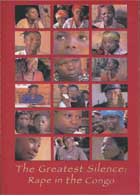
The Greatest Silence: Rape in the Congo 2007
Distributed by Women Make Movies, 462 Broadway, New York, NY 10013; 212-925-0606
Produced by Lisa F. Jackson
Directed by Lisa F. Jackson
DVD, color, 76 min.
Sr. High - Adult
African Studies, Crime, Postcolonialism, Women's Studies
Date Entered: 07/31/2008
Reviewed by Patricia B. McGee, Coordinator of Media Services, Volpe Library & Media Center, Tennessee Technological University“Rape has always been used as a weapon of war.” Thus begins The Greatest Silence: Rape in the Congo, Lisa F. Jackson’s unflinching examination of the horrific epidemic of sexual violence in Congo. When Jackson explains to a group of Congolese rape victims that she too had been a victim of an anonymous gang rape, they didn’t believe her. The women ask where the war was. Jackson had to show them newspaper stories and a magazine article she had written about her attack. Rape victims in Congo, as is typical of rape victims everywhere, blame themselves for the attacks. They are stigmatized by the rape, their marriages are destroyed; the victims are rejected, ashamed, and hide in the bush.
Congo has been at war since 1998; and despite a 2002 truce, war continues in eastern Congo. Hutu militias that cross from Rwanda keep the area in chaos. The Congolese Army is poorly trained, poorly led, and corrupt; soldiers exploit the very people they are supposed to protect. Even UN peacekeepers have faced accusations of sexual misconduct. According to the IRC the death toll from war related causes is over 5.4 million; the number of rape victims is catastrophic. Not only are the women sexually assaulted, many are tortured and brutally mutilated after the rape. These women require multiple, complex surgeries to repair damages; sexual organs are destroyed; and some become permanently incontinent.
At considerable risk to her own safely, Jackson and Bernard her interpreter traveled under UN protection into the bush to interview rapists. Some of these members of the Congolese army, all of whom hid their faces from the camera, maintained that they had been suffering in the forest, and that was the reason they raped. Others believe that rape would enable them to be successful in battle. A single soldier quite frankly said, “It’s all about control.”
Congo is an enormously wealthy, underdeveloped, vast country. A single woman serves as the sex crimes and child protection police in east Congo; rapists behave with impunity; they will not be punished. The consequences for Congo are appalling; children of rape share their mother’s stigma; those who witness great violence are traumatized. All─ physicians, UN soldiers, translators, aid workers, religious leaders─ who come into contact with the numerous victims and hear their horrific stories are shaken by the experience. The epidemic of rape is destroying the very fabric of Congo society. Jackson has created an extraordinary document that gives voice to the silent, and that asks the profound question “If a society can’t protect women and kids, what kind of society is that?” Recently the UN Security Council voted unanimously for a resolution classifying rape as a weapon of war. This is a small step in what will be a very long and difficult journey in bringing the Congo back from the edge of annihilation. Highly recommended for college and university programs and for mature audiences. Note this film deals with violence and contains graphic descriptions of sexual abuse.
Awards
- Sundance Film Festival, Special Jury Prize: Documentary
- London Human Rights Watch Film Festival, Best of Fest
- Roma Independent Film Festival, Best Documentary